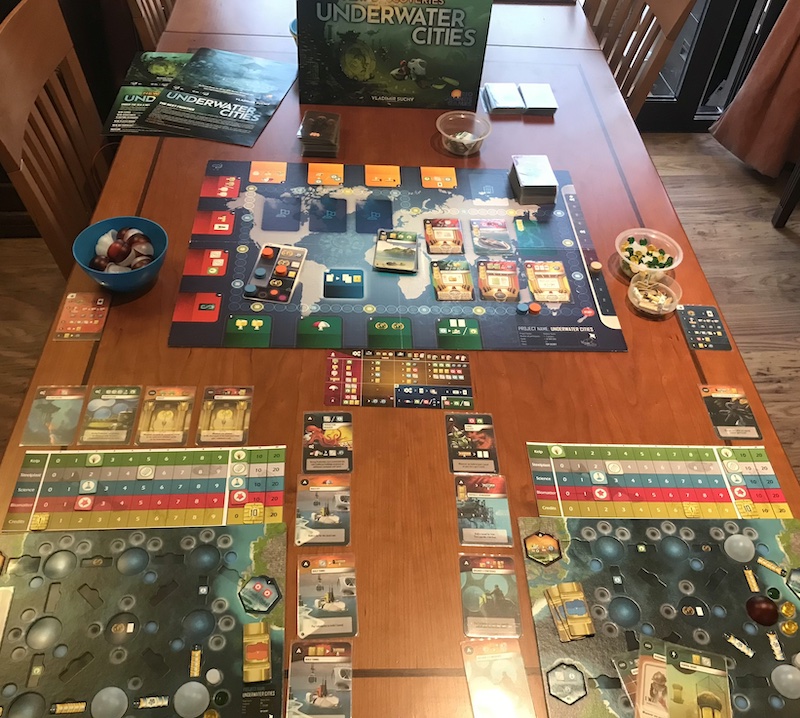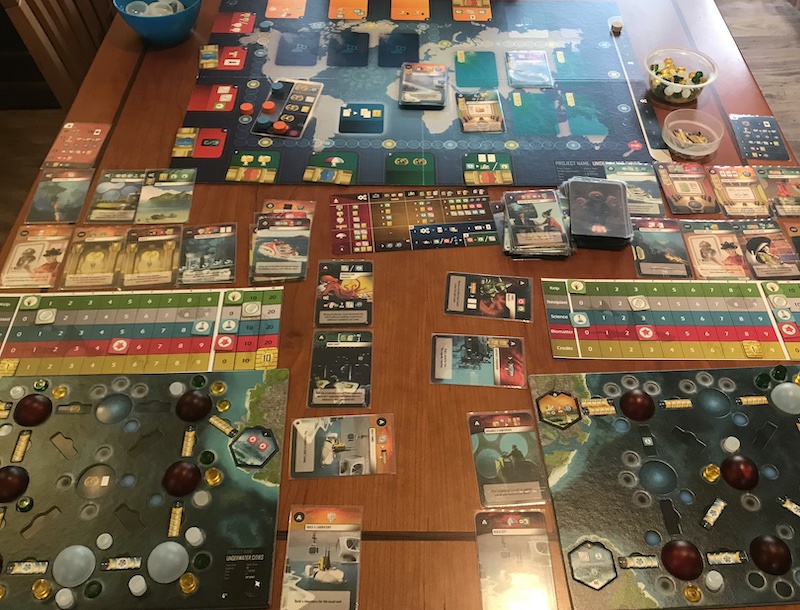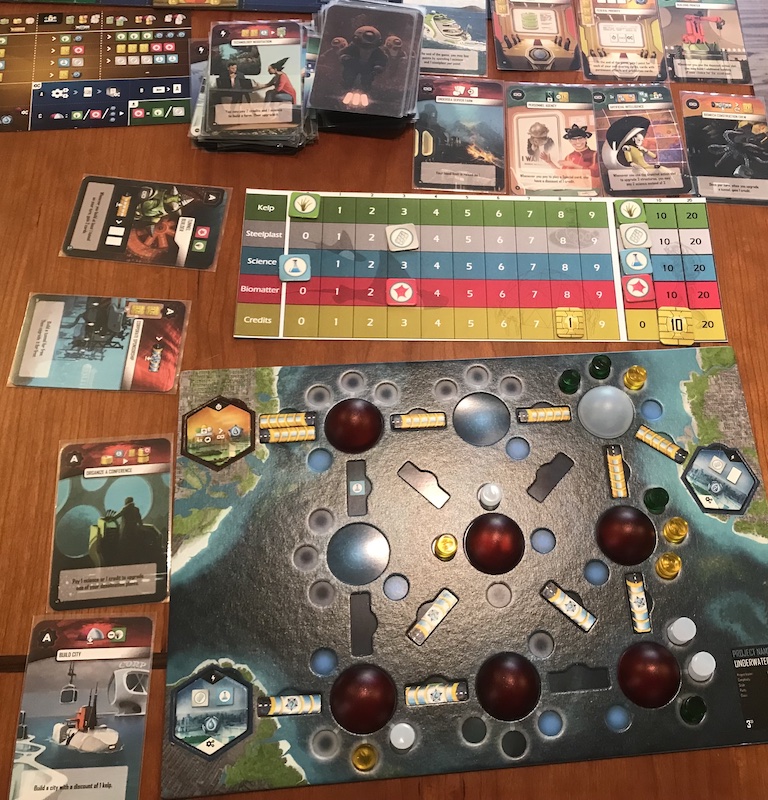Please note: These are just a sample of the games we have - to give you a taste!
Carcassonne
- 5 minute rules
- 2-5 players
- 45 minutes play time
- Tile placement game
- Carcassonne BGG link
A pick and place game with tiles featuring the walled towns, monasteries and farms of the Carcassonne region of France. A simple game to learn but a lot of strategy in the placement of meeples to score points from the landscape features.
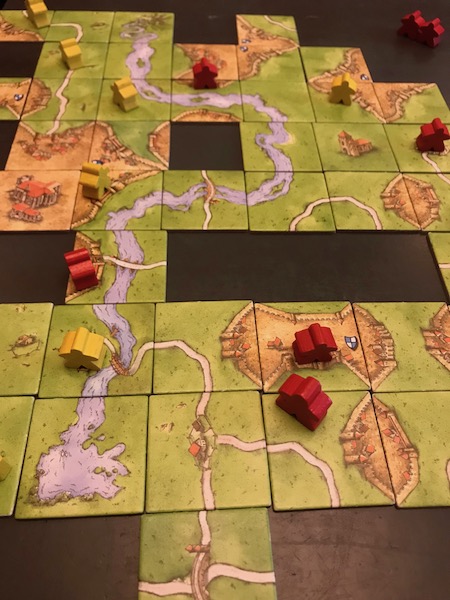
Chocolate Factory
- 1-4 players
- 90 minutes play time
- Board game - resource management
- Chocolate Factory BGG Link
A resource management game with a confectionary theme. There are a variety of ways to earn victory points as manager of a chocolate factory either selling to corner shops for one off cash payouts or providing candies to big department stores, with endgame points for the most stores you serviced and the most goods sold to each. First you have to make the chocolates which means converting beans to cocoa to chocolate bars or chunks to wrapped candies (nuts or caramel) and finally to luxury boxed chocs which obviously earn the most but need the most input. This means building new equipment in your factory and careful management of your coal. Each turn you gain one new factory part and one employee of the day who grants a special power and ability to sell to one of the 5 department stores, so choice of these new assets and then placement of these is vital to optimise your factory. Each day has 3 shifts with an interesting conveyor belt push mechanic to move the chocolate through the factory and upgrade it as required. You have 6 days to develop the factory and sell the most chocolates. The mechanics are a little tricky with 3 phases per day and multiple days to plan so a couple of plays are required to fully appreciate the game and become a master chocolatier.
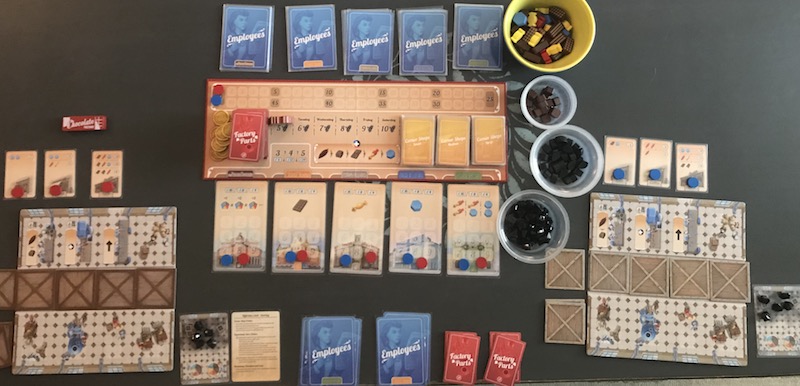
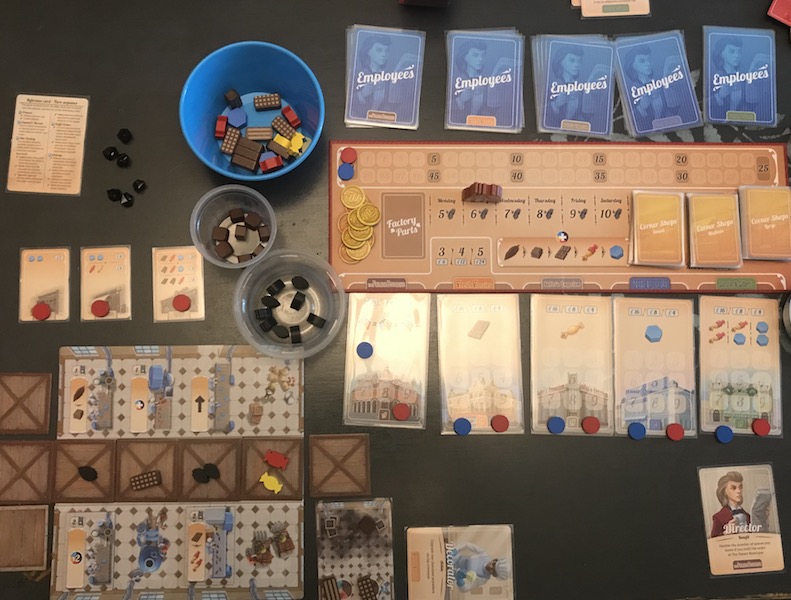
Dominion
- 2-4 players
- 30 minutes play time
- Card based deck building
- Dominion BGG link
One of the first and best deck building games, Dominion has a medieval theme and a huge selection of card combinations within the base deck and through a host of expansions leading to massive variety between games.
Each player starts with the same deck of 10 cards; 7 copper and 3 estates. The aim is to acquire the most victory points before an end condition is reached, usually the supply running out of province cards, the maximum victory point card type.
Each turn you draw 5 cards, play action cards following rules on each card and then spend any treasure cards from that hand to buy other cards. Discard all used cards and once your draw pile is exhausted shuffle the discards to become the new draw pile. This means your deck is constantly growing and cycling and the aim is to keep the deck balanced and maximise the chances of powerful card combinations drawing in the same turn so your available treasure grows and you can buy the big victory point cards.
There are 10 different action cards available per game from a selection of 25 types in the base game. Action cards frequently let you chain multiple actions, draw extra cards, swap or rearrange cards, acquire treasure, or attack other players. So you can try and build a “card engine” that lets you cycle through most of your deck in one turn to access all your treasure or you can try and streamline your deck and convert lower denomination treasures into higher ones so you draw more treasure from fewer cards. Very satisfying when your strategy pays off and frustrating when you are 1 coin short of that final province!
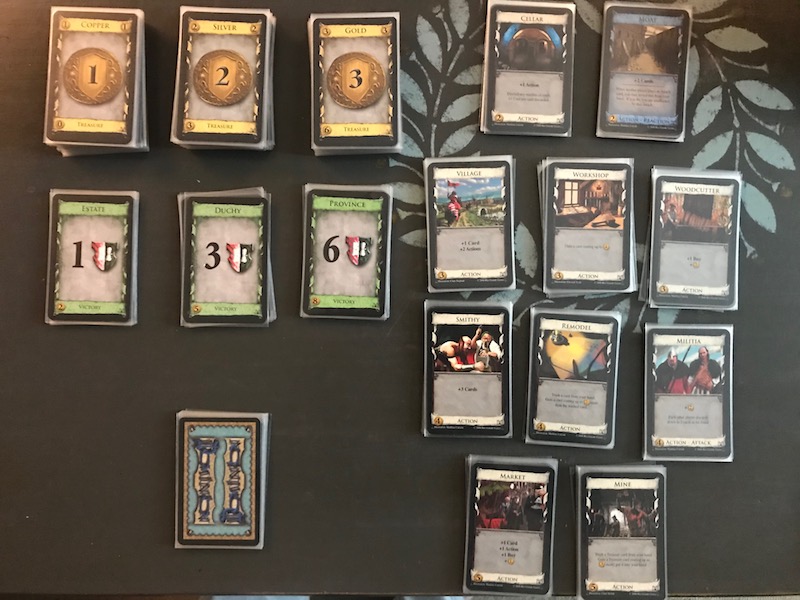
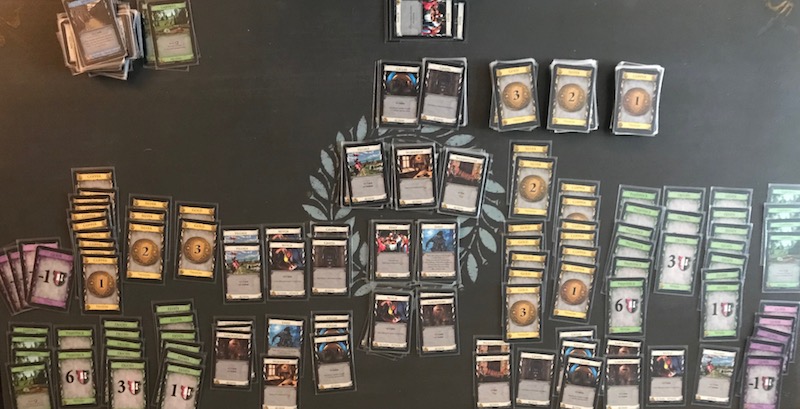
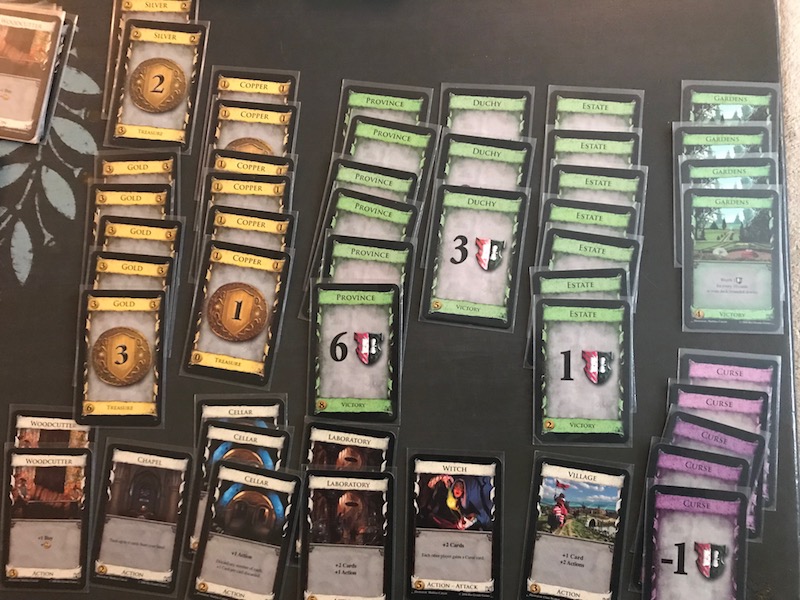
For Sale
- 3-6 players
- 30 minutes play time
- Card based auction mechanic
- For Sale BGG link
This is a property game in 2 phases. First you draft your properties, then you try and sell them for a profit. There are 30 property cards numbered 1-30, with property 1 being a cardboard box in a grubby alley and 30 being a space station, with all kinds of interesting locations in between. Each auction round you reveal an equal number of properties as players and then they bid on them, as players pass they acquire the lowest valued property remaining in that round.
Once all the properties are sold (so everyone has an equal number) then the selling phase starts. Following a similar mechanic, an equal number of money cards as there are players are revealed and each player secretly chooses one of their properties to bid in the round. Highest value property snags the highest value money card and so on down the chain. Play continues until all properties are sold and you count up how much money you made. As the money values per round are randomised and range between £0 and £15,000, by the end of the game there can be some quite surprising sales with that cardboard box netting more than a nice riverboat or a camper van doing better than a luxury apartment.
It is a quick and fun game with some nice card artwork, another good filler game or ice breaker with family or less seasoned gamers.
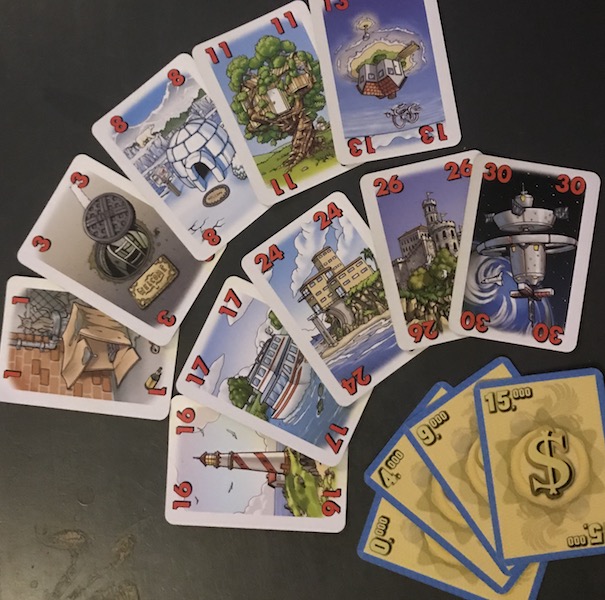
Neom
Create the City of Tomorrow
- 1-5 players
- 45 minutes play time
- Tile placement
- Neom BGG link
A pass and play city tile building game over 3 generations. Each starting city grid has a different raw good central tile, and each era starts with 8 tiles given to each player. Each turn you play 1 to your city and pass the rest until 7 have been played and the final one discarded.
To play tiles you must either have the resources available on already played tiles in your city or buy from other players and respect grid/road related tile placement rules. Placed tiles will add resources which scale over the 3 generations (raw goods, processed goods, luxury goods), or generate income. At the start of the game there is also a cornerstone tile drafting element where you can select 3 extra tiles (generally victory point or money generating) to hold in your hand and play once per generation instead of the tiles you have been passed. At the end of each generation income is collected from commercial buildings and 8 new next generation tiles are distributed per player.
Scores are determined by special victory point generating tiles, resources generated by the city, final cash, and size of residential areas, while points are lost by residential areas being near polluting factories or the city having no power generation building.
If you like 7 Wonders the general mechanics will be familiar but the game adds a tile placement mechanic for a bit of added variety.
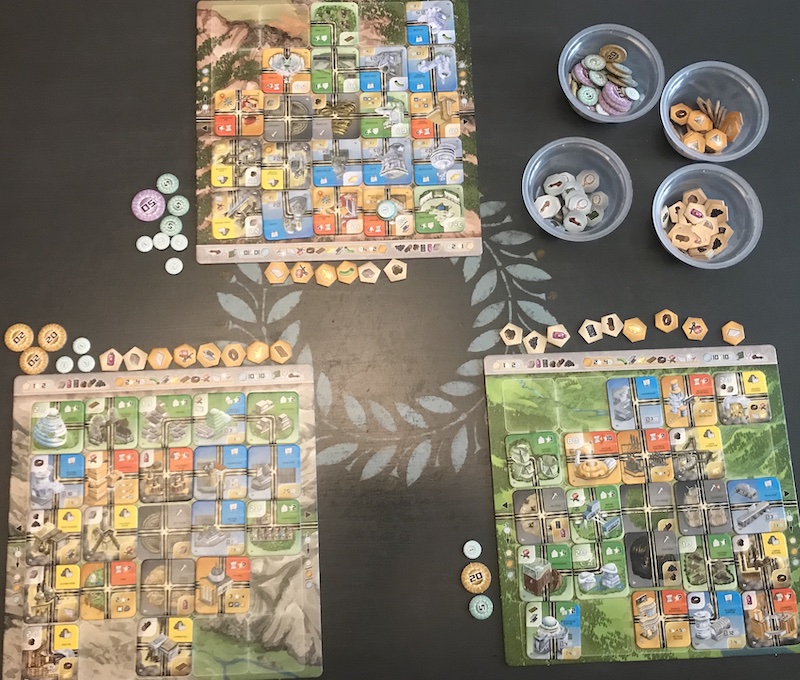
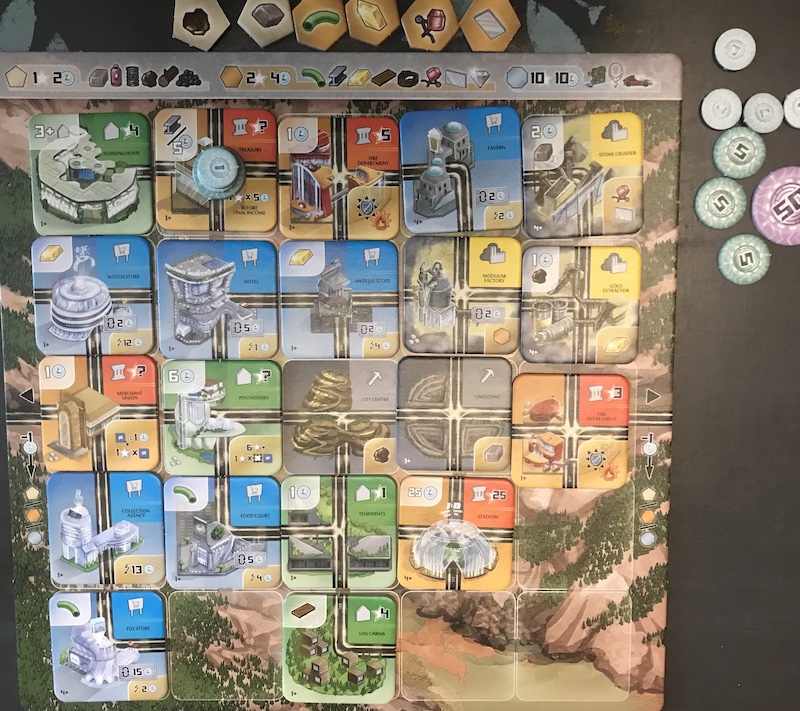
Orléans
- 1-5 players
- 90 minutes play time
- Bag builder and board game
- Orléans BGG link
Set in the Orléans region of medieval France, the aim is to gain dominance of the region through a number of ways to score victory points over 18 rounds. Each round an hour glass tile is revealed, which introduces an event for that round: Some good that generate income, but most bad that tax income or resources, kill characters (plague), or prevent the use of character or travel types. Then you draw character tiles from your bag - everyone starts with the same 4 basic followers (farmer, boatman, craftsman, and trader) and the ability to draw 4 followers from the bag. Placing followers on different buildings in your city will either generate new workers to join your city or allow travel around the region board.
Balancing the tiles in your bag so you can draw the combinations required next round, or improvising new strategies to work with the followers that have been picked is key to the game. Adding knights lets you draw more followers each turn and travel the region, monks are like wild cards and can fill any worker icon type, scholars will help generate development points, traders will expand the city generating new buildings with special effects when populated, and craftsmen generate technology tiles that can permanently fill a space in the city.
Followers can also be exiled to the communal beneficial deeds board generating coins and a citizen tile for the player finishing a deed. Travelling the communal region board will let you pick up resources and build guildhalls. Citizen tiles can also be gained by being the first to reach certain points on the development or worker tracks or most trading stations. End of game scores are based on coins and resources acquired and trading stations plus citizen tiles multiplied by development status.
The game is a different twist on the card based hand management games. It is difficult to plan ahead due to the random hour glass tile conditions to satisfy each round or unfortunate tile draws, but in general all players will be affected by these and have to cope with some difficult rounds. There is a big expansion pack adding more variants to the game, focusing on the different elements building up workers or travelling the region (which can help when teaching as there are quite a lot of mechanics to learn and balance) and numerous solo options.
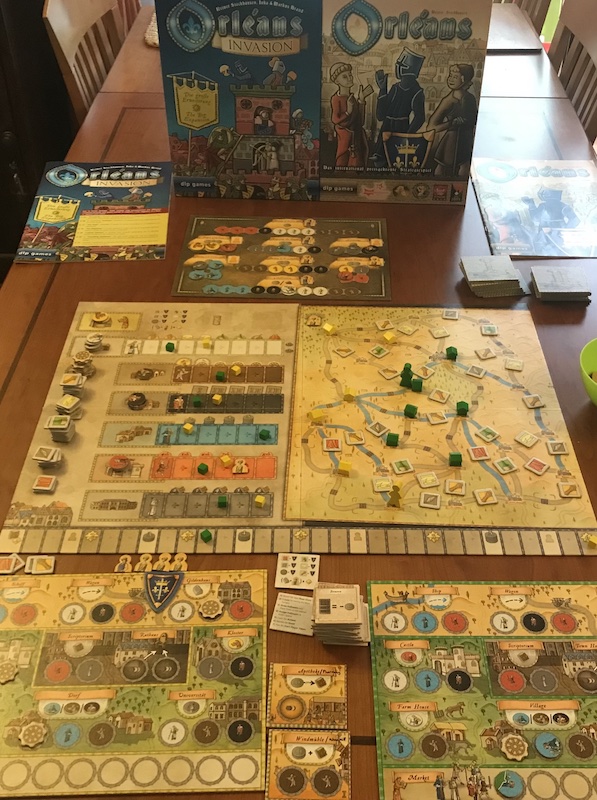
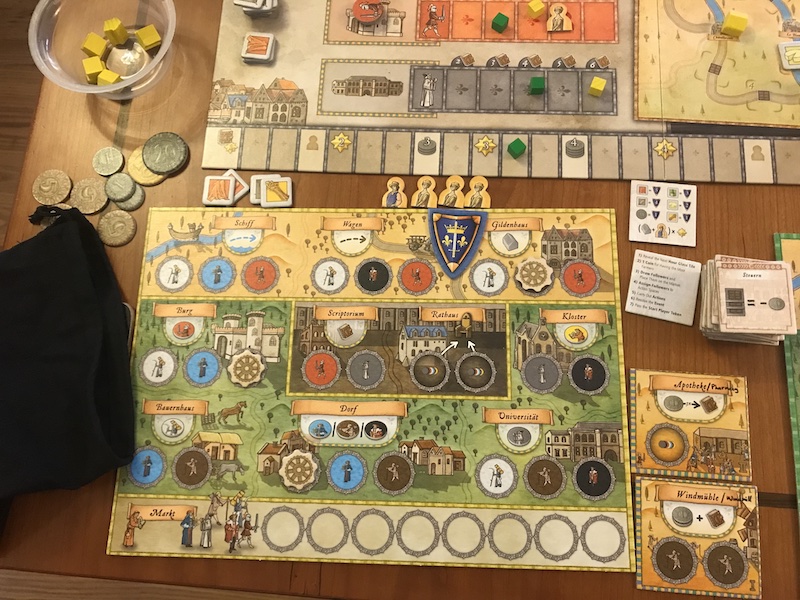
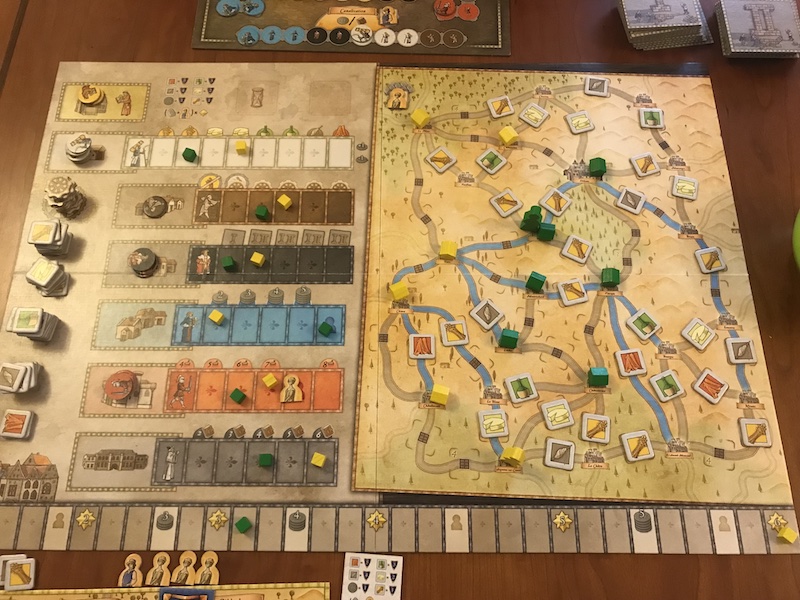
Settlers of Catan
- 3-4 players
- 60 minutes play time
- Board game
- Settlers of Catan BGG link
An island is generated from hexagonal tiles so every game is different. You need to connect and develop your towns using natural resources which are generated by rolling two dice each turn. The numbers 2-12 are linked to each land based hex tile. The twist is some numbers and hence some resources are more common than others and you gain resources depending on which numbered tiles your towns border. You need to balance your resources based on your key incomes and trade for what you are missing.
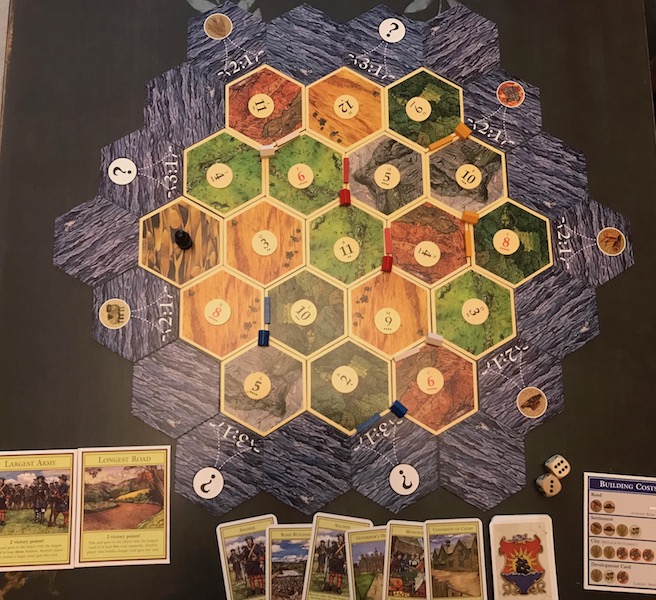
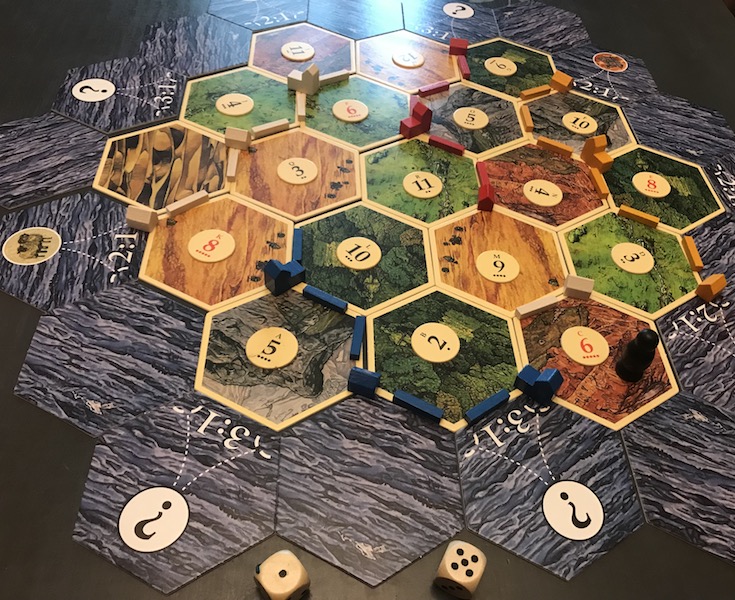
Ticket to Ride
- 5 minute rules
- 2-5 players
- 60 minutes play time
- Board game
- Ticket to Ride Europe BGG link
Build a network of train routes across the map, numerous geographical versions are available, the Europe variant is shown in the images. A simple game mechanic, on your turn pickup colour cards or play the cards and place trains to claim the coloured routes on the map. Your score more for building longer routes or at game end by demonstrating that you have connected the cities according to tickets secretly chosen at the start of the game.
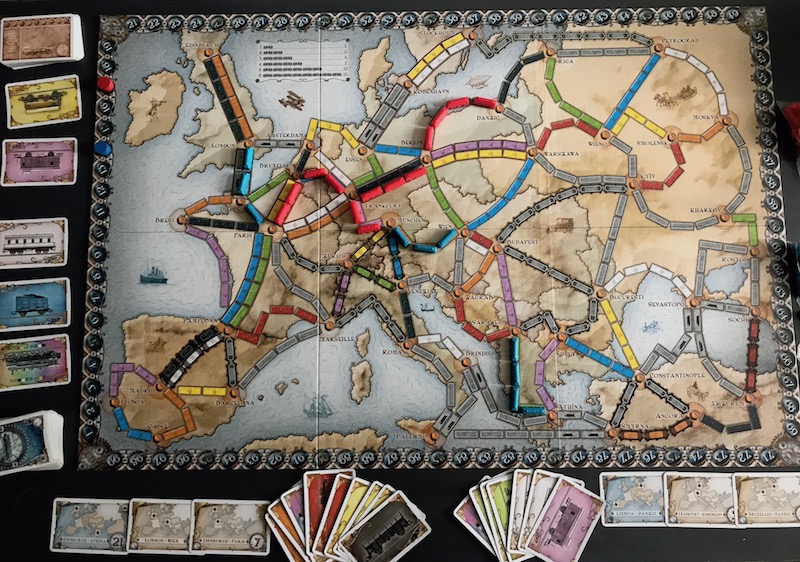
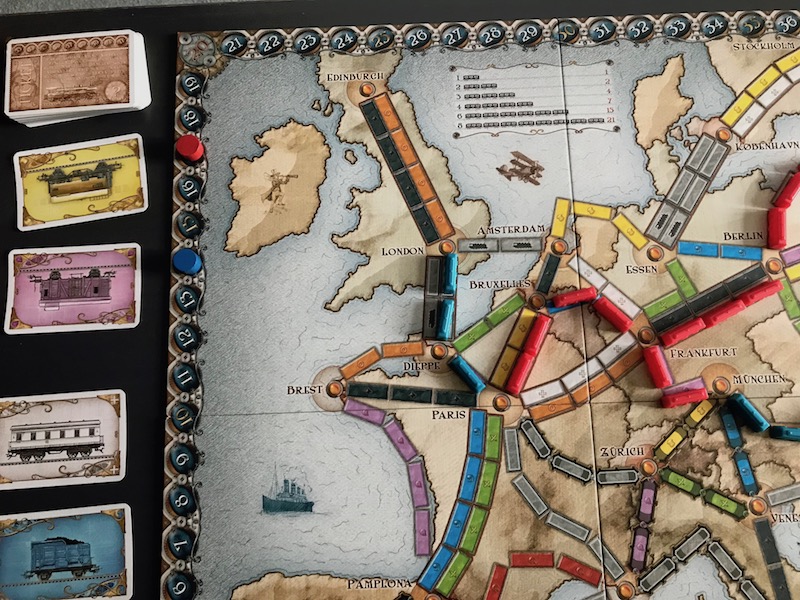
The City
- 2-5 players
- 15 minutes play time
- Card drafting
- The City BGG link
A good filler game for the start of a session, quick to play and explain. Players draw 7 cards with city based structures like shops, housing, parks, schools, industry or monuments, discard down to 5 and then each round play a card into their city. To play a card you discard the number of cards indicated in the top left with more powerful cards requiring higher numbers of discards. Everyone secretly selects their card and plays at the same time, then everyone looks at the bottom of the cards in their entire city and counts up victory points and number of new cards they can draw. Thus over the rounds the number of new cards gained and victory points steadily increases. Maximum hand size of 12 cards, first to 50 or more points and many of the cards interact for additional points.
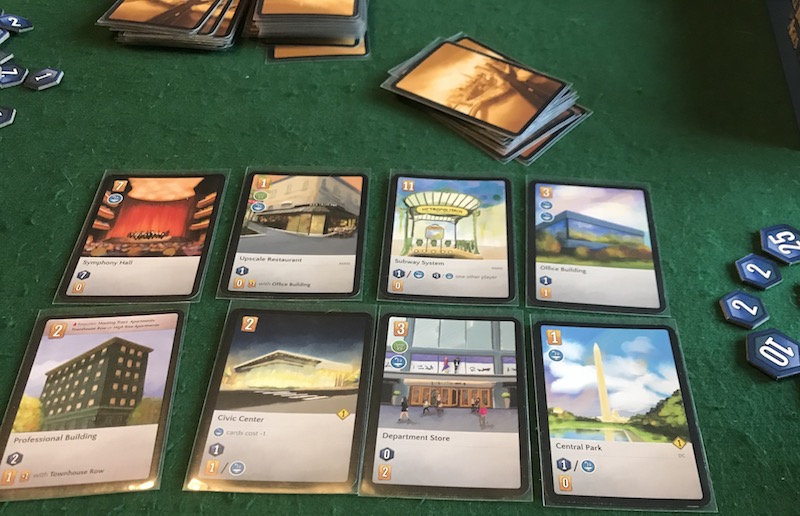
Underwater Cities
- 1-4 players
- 60 minutes play time
- Card and board game
- Underwater Cities BGG link
Compete to build the best underwater city. Each turn players select an action, but once that action is selected no other player can use it that round (the board is double sided to allow different actions and number of action slots scaled to the number of players). They can then pair that action with a card of the same colour from their hand, so if you have kept the right cards (hand limit 3) you can have 2 actions per turn.
Actions generate resources (kelp, steelplast, science, biomatter, or credits), or allow you to build tunnels, new city domes, or buildings (farm, desalination plant, laboratory) on domes, or upgrade buildings. Cards are either instant actions and discarded or played to your tableau and their action can trigger throughout the game, e.g. biomech construction crew will generate a resource after a certain building has been upgraded.
After 4 rounds there is a production phase and your buildings will generate resource, credits, or victory points, and a new pack of era cards is used for the draw pile. There are 3 eras then final scoring. Order of play each round can be altered using diplomacy, actions can allow you to change places on the federation track and that determines turn order and hence first pick of the most critical action slots. There are also special cards that you can see (unlike the draw pile to refresh your hand), which are acquired via an action, including 6 randomly selected end-game scoring cards.
At the start of the game players are randomly given 3 metropolis tiles, and if these are connected into the city network they will generate resource or victory points. Final scores are calculated from metropolis tiles, end-scoring cards played to your tableau, city network scores based on domes and buildings, and final resources score too.
If you like Wingspan then this is a familiar feel, a different theme but a turn based choose an action, develop a tableau, and chain card powers with multiple routes to victory points. Games will vary based on the metropolis tiles drawn at game start, cards drawn to your hand, special cards acquired, and in the expansion your personal assistant with different powers (who doesn’t want to build a city with a sentient octopus production manager, tardigrade tunnel builder, or shark headhunter?)
